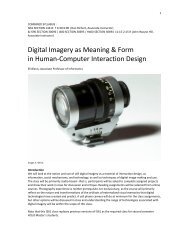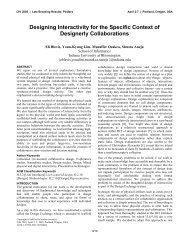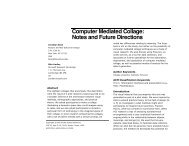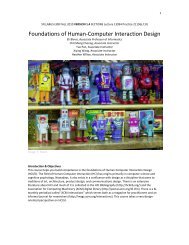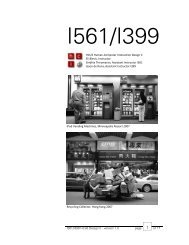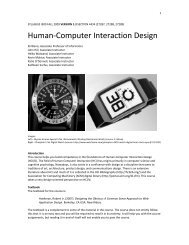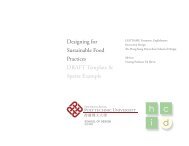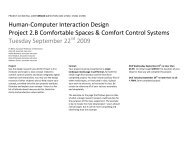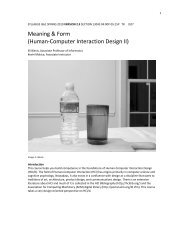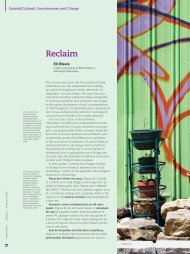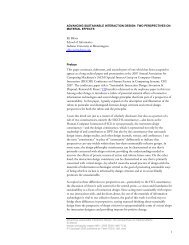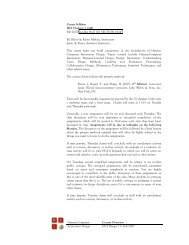Hungry 24/7? HCI Design for Sustainable Food Culture
Hungry 24/7? HCI Design for Sustainable Food Culture
Hungry 24/7? HCI Design for Sustainable Food Culture
You also want an ePaper? Increase the reach of your titles
YUMPU automatically turns print PDFs into web optimized ePapers that Google loves.
<strong>Hungry</strong> <strong>24</strong>/7? <strong>HCI</strong> <strong>Design</strong> <strong>for</strong> <strong>Sustainable</strong> <strong>Food</strong> <strong>Culture</strong><br />
Jaz Hee-jeong Choi<br />
Queensland University of<br />
Technology<br />
Brisbane QLD 4059, Australia<br />
h.choi@qut.edu.au<br />
Eli Blevis<br />
Indiana University<br />
Bloomington, IN, USA<br />
eblevis@indiana.edu<br />
ABSTRACT<br />
This workshop proposes to explore new approaches to<br />
cultivate and support sustainable food culture in urban<br />
environments via human computer interaction design and<br />
ubiquitous technologies. <strong>Food</strong> is a challenging issue in<br />
urban contexts: while food consumption decisions are<br />
made many times a day, most food interaction <strong>for</strong><br />
urbanites occurs based on convenience and habitual<br />
practices. This situation is contrasting to the fact that food<br />
is at the centre of global environment, health, and social<br />
issues that are becoming increasingly immanent and<br />
imminent. As such, it is timely and crucial to ask: what<br />
are feasible, effective, and innovative ways to improve<br />
human-food-interaction through human-computerinteraction<br />
in order to contribute to environmental, health,<br />
and social sustainability in urban environments? This<br />
workshop brings together insights across disciplines to<br />
discuss this question, and plan and promote individual,<br />
local, and global change <strong>for</strong> sustainable food culture.<br />
Author Keywords<br />
food; sustainability; environment; health; social change;<br />
urban in<strong>for</strong>matics; ubiquitous computing<br />
ACM Classification Keywords<br />
H5.0. In<strong>for</strong>mation interfaces and presentation (e.g., <strong>HCI</strong>):<br />
General. K.4.2 Social Issues.<br />
INTRODUCTION<br />
Many interactions with food create a culture of<br />
imagining, producing, preparing, and consuming food – a<br />
‘food culture’ of the community at a collective level.<br />
Conversely, food culture influences behaviours of both<br />
the community and the individual. Accordingly, changing<br />
individuals’ dispositions to food in day-to-day life<br />
towards more sustainable values presents opportunities<br />
<strong>for</strong> bringing about improvements in the sustainability of<br />
food cultures at a broader level. The current urban<br />
environments present particularly challenging issues as<br />
everyday food interaction <strong>for</strong> many citizens simply<br />
involves consuming ready-made meals and processed<br />
food. The problem continues to intensify with the<br />
OZCHI 2009, November 23-27, 2009, Melbourne, Australia.<br />
Copyright the author(s) and CHISIG<br />
Additional copies are available at the ACM Digital Library<br />
(http://portal.acm.org/dl.cfm) or ordered from the CHISIG secretary<br />
(secretary@chisig.org)<br />
OZCHI 2009 Proceedings ISBN: x-xxxxx-xxx-x<br />
Marcus Foth<br />
Queensland University of<br />
Technology<br />
Brisbane QLD 4059, Australia<br />
m.foth@qut.edu.au<br />
1<br />
Greg Hearn<br />
Queensland University of<br />
Technology<br />
Brisbane QLD 4059, Australia<br />
g.hearn@qut.edu.au<br />
Tad Hirsch<br />
Intel Research<br />
Portland, OR, USA<br />
tad.hirsch@intel.com<br />
unprecedented scale of urban growth in recent years. Now<br />
over half of the global population is living in urban areas.<br />
The UN Population Fund (UNFPA, 2007, p. 2) predicts<br />
that the urban population will grow further to reach 60%<br />
of the entire global population by 2030.<br />
In this current milieu, what kind of contributions can we<br />
make from the perspective of human-computerinteraction?<br />
More specifically, there are three domains of<br />
enquiry this workshop addresses in this regard. Firstly,<br />
what are the specific areas of sustainable food culture that<br />
require imminent attention from <strong>HCI</strong>? Secondly, what are<br />
innovative and effective research approaches that allow<br />
us to address and investigate such areas? Thirdly, what<br />
are design approaches to instigate positive changes<br />
towards sustainable food culture through <strong>HCI</strong>? The<br />
workshop intends to bring together these three whats to<br />
consider the fundamental and pragmatic question of how<br />
to conceptualise, design, deploy, and utilise ubiquitous<br />
technologies in everyday urban life within diverse<br />
sociocultural contexts in order to cultivate and promote<br />
sustainable food culture.<br />
TOPICS OF INTEREST<br />
As evident in many grassroots initiatives such as the<br />
Local <strong>Food</strong> Movement (collaborative ef<strong>for</strong>t to build more<br />
locally based, self-reliant food economies – cf. Feenstra,<br />
2002, p. 100) and Slow <strong>Food</strong> International (non-profit<br />
group focusing on preservation of the cultural, culinary,<br />
and artistic local traditions – cf. Jones, et al., 2003, p.<br />
301), significant trans<strong>for</strong>mations arise from large-scale<br />
consensual participation of individuals identifying with<br />
the value of a sustainable lifestyle both conceptually and<br />
pragmatically. To this end, we suggest (but do not limit<br />
to) three broad topics of interests <strong>for</strong> this workshop:<br />
Participatory Networks<br />
Hartley (1999, p. 178) asserts that participatory or DIY<br />
culture is fast becoming a core element of contemporary<br />
society (at least in developed nations) in which<br />
citizenship is construed through ‘practice’ of self<br />
identification by individuals rather than a ‘contract<br />
between state and subject.’ Ubiquitous technologies make<br />
urban environments ever conspicuously technosocial<br />
(technological and social) networks that are constantly<br />
reconfigured by people as its users and constituents.<br />
There<strong>for</strong>e, urban sustainability can no longer be achieved<br />
or imagined without allowing people to voluntarily
interact with and through their environment and other<br />
people, to recreate the place according to their needs and<br />
desires both collectively and individually. How can we<br />
create, sustain, and encompass such participatory<br />
networks via ubiquitous technologies?<br />
Research and <strong>Design</strong> Methods<br />
Creating sustainability networks requires identifying,<br />
conceptualising, and innovating the current technological,<br />
sociocultural, and material challenges of the given<br />
context. As such, disciplinary boundaries – particularly in<br />
the <strong>for</strong>m of academic compartmentalisation – need to be<br />
reconsidered and constructively refocalised. The<br />
workshop invites discussion on empirical and theoretical<br />
cases of design and implementation strategies across<br />
various disciplines.<br />
Deployability and Interoperability<br />
Since sustainability – be it environmental, health, and<br />
social – has become an imminent and immanent issue,<br />
designing and developing technologies <strong>for</strong> sustainability<br />
must be practically and efficiently deployable and<br />
interoperable with adequately long lifetimes within the<br />
current conditions of society. What are some of the core<br />
elements of consideration in this regard? How can we<br />
better understand, measure, and respond to them <strong>for</strong><br />
sustainable design and use of technologies themselves?<br />
LOCALLY SPECIFIC VS. UNIVERSAL<br />
While network technology is now a global lexicon it<br />
comprises of diverse dialects according to its use context.<br />
Similarly, sustainability is concurrently a global and<br />
inherently local concern; the meaning of sustainability<br />
varies amongst individuals, communities, and broader<br />
collective entities according to their value contexts. The<br />
workshop calls <strong>for</strong> a comparative look on both locally<br />
specific and common aspects of technosocial cultivation<br />
of sustainable food culture/s; it also asks how these<br />
aspects can be effectively coalesced in human-computerinteraction.<br />
WORKSHOP FORMAT<br />
We wish to acknowledge the cultural and ecological<br />
diversity of the Asia-Pacific region in conducting this<br />
workshop. Accordingly, the workshop functions as an<br />
open and active <strong>for</strong>um <strong>for</strong> <strong>for</strong>ward-thinking practitioners<br />
and scholars to address and enhance the role of humancomputer-interaction<br />
in creating and maintaining<br />
environmental, health, and social sustainability that food<br />
culture manifests in our urban daily lives. We also<br />
welcome contributions from those who are not currently<br />
in fields that are directly related to food research. To this<br />
end, the workshop is organised to incorporate a small<br />
degree of individual presentations of work with a more<br />
explorative series of collective brainstorming activities<br />
and discussions. The overall outcome will be integrated<br />
2<br />
arrays of theoretical and pragmatic approaches towards<br />
sustainable local and global food culture.<br />
Participation and Registration<br />
We kindly ask prospective participants to submit a short<br />
position statement (300-500 words) or abstract by 20th<br />
September 2009. Please send all submissions and queries<br />
to Jaz Choi at h.choi@qut.edu.au. Acceptance<br />
notification will be sent by 27th September 2009.<br />
Web:<br />
http://food.urbanin<strong>for</strong>matics.net/events/ozchi2009/<br />
Facebook:<br />
http://www.facebook.com/event.php?eid=128413300549<br />
&ref=mf<br />
THE ORGANISERS<br />
Jaz Hee-jeong Choi: Researcher, Institute <strong>for</strong> Creative<br />
Industries and Innovation, Queensland University of<br />
Technology, Australia. www.nicemustard.com. Favourite<br />
dish: chilli-love-surprise/s<br />
Marcus Foth: Senior Research Fellow, Institute <strong>for</strong><br />
Creative Industries and Innovation, Queensland<br />
University of Technology, Australia.<br />
www.urbanin<strong>for</strong>matics.net. Favourite dish: Korean<br />
pancakes and makgeolli.<br />
Greg Hearn: Research Professor in the Creative<br />
Industries Faculty at Queensland University of<br />
Technology, Australia. cci.edu.au/profile/greg-hearn.<br />
Favourite dish: Vietnamese tofu rice wraps – roll your<br />
own version.<br />
Eli Blevis: Associate Professor of In<strong>for</strong>matics, School of<br />
In<strong>for</strong>matics and Computing, Indiana University--<br />
Bloomington USA. eli.in<strong>for</strong>matics.indiana.edu. Favourite<br />
dish: Cheese omelette (with home grown chives).<br />
Tad Hirsch: senior research scientist, people and<br />
practices research, Intel Corporation, USA. Favourite<br />
dish: whatever is fresh in the market this morning, with a<br />
decent glass of wine.<br />
REFERENCES<br />
Feenstra, G. Creating space <strong>for</strong> sustainable food systems:<br />
Lessons from the field. Agriculture and Human Values<br />
19, 2 (2002), 99-106.<br />
Hartley, J. Uses of television. London ; New York:<br />
Routledge (1999).<br />
Jones, P., Shears, P., Hillier, D., Com<strong>for</strong>t, D., & Lowell,<br />
J. Return to traditional values? A case study of Slow<br />
<strong>Food</strong>. British <strong>Food</strong> Journal, 105, 4/5 (2003), 297-304.<br />
UNFPA. State of World Population 2007: Unleashing the<br />
Potential of Urban Growth. New York: United Nations<br />
Population Fund (2007).



